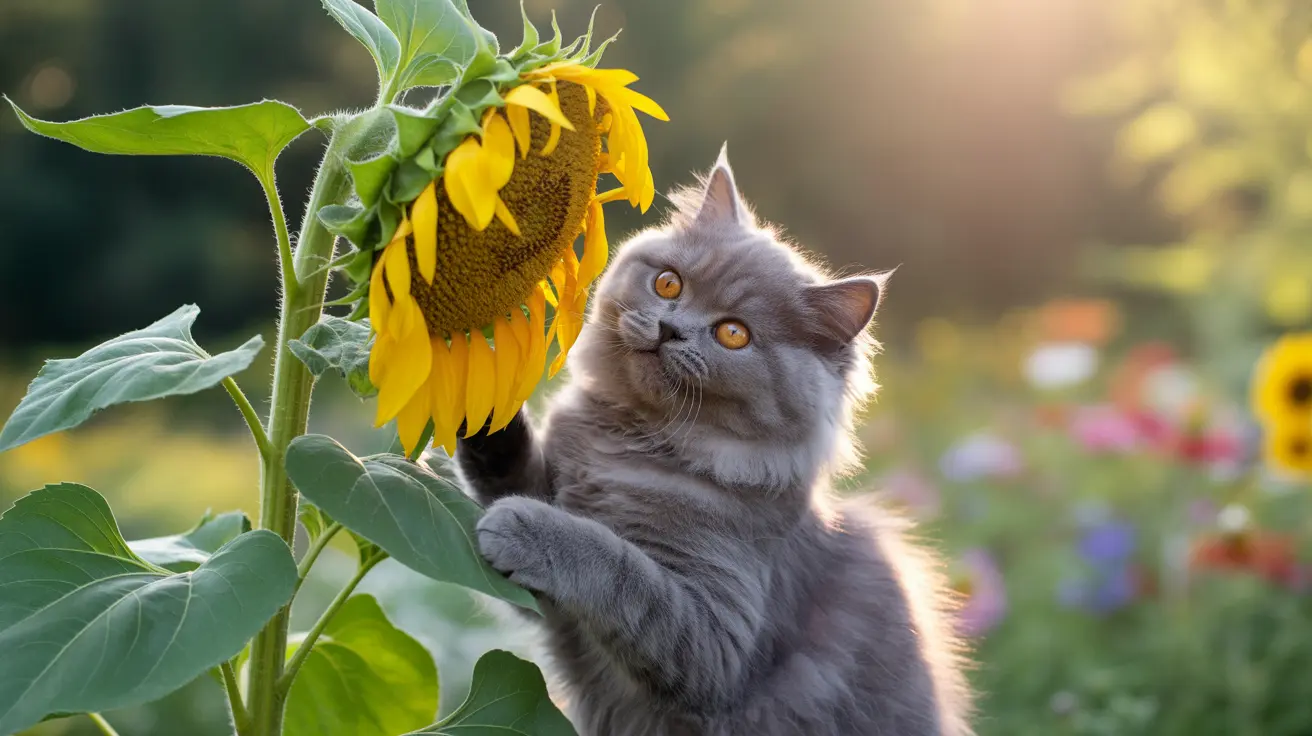Understanding Sunflower Safety for Cats
If you're a cat parent who loves decorating with flowers, you've probably wondered: are sunflowers safe for cats? The good news is that sunflowers (Helianthus annuus) are classified as non-toxic to cats by the American Society for the Prevention of Cruelty to Animals (ASPCA) and other leading veterinary organizations.
While these cheerful blooms can safely coexist with your feline friends, it's important to understand the specifics of sunflower safety and what precautions you should take as a responsible pet owner.
Different Parts of the Sunflower: Safety Breakdown
Petals and Leaves
The petals and leaves of sunflowers are completely non-toxic to cats. If your curious kitty takes a nibble, there's typically no cause for concern. However, like any plant material, excessive consumption could lead to mild digestive upset.
Stems and Stalks
While not toxic, sunflower stems are fibrous and tough. Cats should be discouraged from chewing on these parts as they could pose a choking hazard or cause intestinal irritation if swallowed in large pieces.
Seeds and Shells
Sunflower seeds themselves are safe for cats in moderation, but only when dehulled. The outer shells can be dangerous as they may:
- Cause choking
- Create intestinal blockages
- Lead to dental issues
- Result in digestive discomfort
Monitoring Your Cat Around Sunflowers
Even though sunflowers are safe, it's important to watch your cat's behavior around these plants. Some cats may be more attracted to sunflowers than others, potentially leading to excessive consumption.
Keep an eye out for these normal behaviors:
- Casual sniffing and investigation
- Occasional gentle nibbling
- Brief interest in moving leaves or petals
When to Contact Your Veterinarian
While sunflowers are non-toxic, certain situations warrant veterinary attention:
- Excessive drooling or vomiting
- Persistent diarrhea
- Signs of intestinal blockage
- Lethargy or unusual behavior
- Difficulty breathing or swallowing
Safe Plant Alternatives for Cat Households
If you're looking to create a cat-friendly garden or indoor space, consider these other safe options alongside sunflowers:
- Cat grass
- Spider plants
- Boston ferns
- African violets
- Roses (without thorns)
- Orchids
Frequently Asked Questions
Are sunflowers safe for my cat to nibble on or eat?
Yes, sunflowers are non-toxic to cats. While occasional nibbling is safe, excessive consumption should be discouraged to prevent mild stomach upset.
Can eating sunflower seeds or sunflower oil harm my cat?
Dehulled sunflower seeds and sunflower oil are safe in moderation. Never give cats seeds with shells, and introduce any new treats gradually after consulting your veterinarian.
What symptoms should I watch for if my cat eats too much sunflower?
Monitor for signs of mild digestive upset such as vomiting or diarrhea. While rare, these symptoms typically resolve on their own but should be watched carefully.
How can I introduce sunflower seeds safely as treats for my cat?
Offer only dehulled seeds in small amounts (1-2 seeds) occasionally as treats. Always consult your veterinarian before introducing new foods to your cat's diet.
Why do cats seem attracted to sunflowers, and is it normal behavior?
Cats may be attracted to sunflowers due to their movement, texture, or natural instinct to explore plants. This curiosity is normal behavior, though excessive plant-eating should be discussed with your vet.
Conclusion
Sunflowers make a beautiful and safe addition to homes with cats. While these bright blooms pose no toxic threat to your feline friends, responsible pet ownership means monitoring their interaction with any plants and preventing excessive consumption. By following the guidelines outlined above, you can enjoy these cheerful flowers while keeping your cat safe and healthy.






